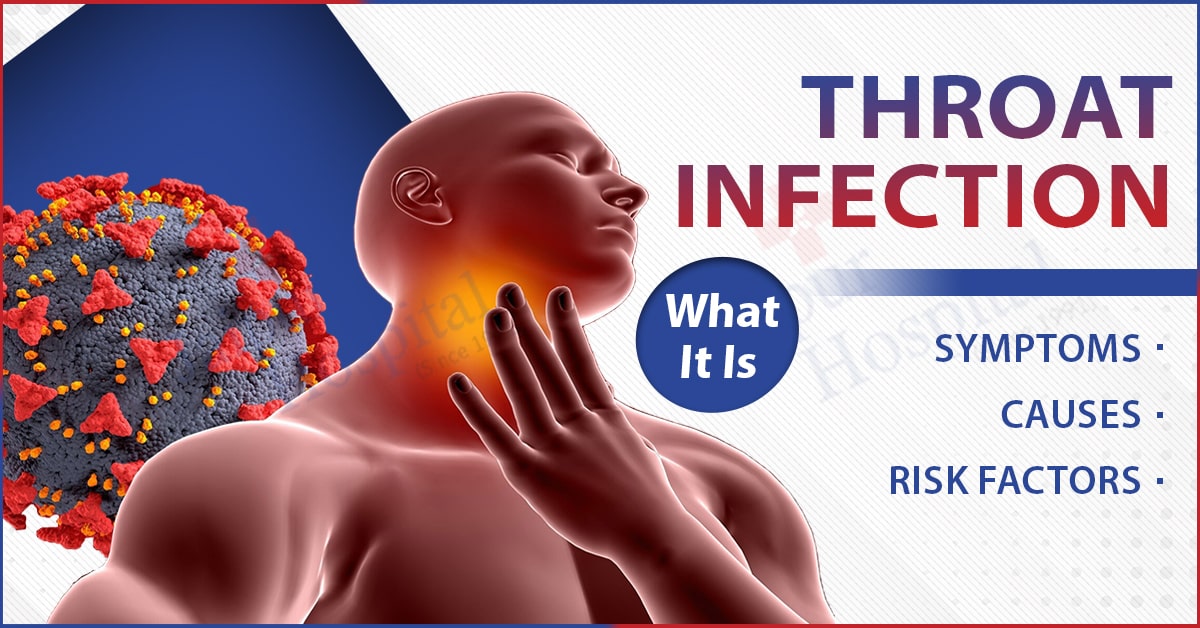Introduction
Throat infections are one of the most common respiratory disorders that develop in the upper part of the respiratory tract. They are usually caused by infection with bacteria, viruses, or fungi in the throat region, leading to swelling, pain, and other assorted symptoms. In this article, we have discussed what a throat infection is, what the symptoms to look out for are, common causes of infections, risk factors for developing increased susceptibility, the different types of infections in the throat, prevention methods, and treatments that cut down symptoms and speed up healing.
Read Also: Vaginal Yeast Infection: Causes, Symptoms and Treatment
What Is Throat Infection?
A throat infection is an inflammation of the throat that is caused by bacterial, viral, or fungal infections. Its symptoms include pain irritation and, in some cases, difficulty swallowing. Infections can be found in the pharynx, tonsils, or larynx and vary in their severity depending on the cause.
Types of Throat Infection
Throat infections can be classified into several types based on the affected area and the underlying cause. The main types include:
- Etiologies: Common cold and strep throat caused by viral and bacterial infections respectively are the commonly seen etiologies leading to pharyngeal inflammation.
- Tonsillitis: These are inflamed tonsils primarily due to viral or bacterial infection. Swollen with red tonsils and also white patches.
- Laryngitis: Is an inflammation of the larynx or voice box, caused most often by viral infections or by overuse of the voice and irritants such as smoke. It can cause hoarseness or loss of voice.
- Strep Throat: Infection by Group A Streptococcus that manifests with a very sore throat and fever with swollen lymph nodes.
- Viral Pharyngitis: It often occurs from viral infections, including flu, common cold, or mononucleosis, and is generally self-limiting but can be sore and very painful to the throat.
Signs and Symptoms of Throat Infection
The signs and symptoms of a throat infection can vary depending on the cause and type of infection, but common indicators include:
- Sore Throat: A persistent, gnawing pain or discomfort in the throat, typically worsening with swallowing.
- Redness or Swelling: The throat can be red and swollen, and the tonsils are usually swollen.
- Swallowing Difficulty: Painful or uncomfortable swallowing of food, liquids, or saliva.
- Fever: Many bacterial infections, including strep throat, have an associated high temperature.
- Hoarseness or Loss of Voice: This is often more prominent with laryngitis, where the voice box is inflamed.
- White Patches or Pus: Visible spots on the tonsils or back of the throat, often associated with bacterial infections such as strep throat.
- Swollen Lymph Nodes: Tender or swollen lymph nodes in the neck.
- Cough: The infection may be accompanied by a dry or productive cough, especially in viral infections.
- Headache and Fatigue: General malaise, headache, and feeling run-down are common symptoms, especially with viral infections.
- Bad Breath: Infections of bacteria can cause an embarrassing odor from the mouth.
Causes of Throat Infection
Throat infections can be caused by various factors, including:
- Viral Infections:
- Common Cold: Resulted from rhinoviruses and causes sore throat and common cold symptoms.
- Influenza (Flu): Resulted in sore throat, fever, and body aches.
- Mononucleosis: This resulted from the Epstein-Barr virus that caused extreme soreness in the throat and swollen lymph nodes.
- Adenovirus: This results in a throat infection with fever and congestion.
- Bacterial Infections:
- Strep Throat: This is a result of Group A Streptococcus causing severe sore throat, fever, and swollen tonsils.
- Tonsillitis: This is a bacterial infection that leads to inflammation of the tonsils.
- Diphtheria: A rare bacterial infection resulting in a thick coating of the throat and difficulty breathing.
- Fungal Infections:
- Candidiasis (Thrush): Caused by Candida, with white patches in the throat, most often in immunocompromised patients.
- Irritants and Allergies:
- Smoke, Pollution, and Chemicals: Irritates and inflames the throat.
- Allergic Reactions: Allergies to pollen, dust, or pets can irritate the throat.
- Poor Oral Hygiene:
- Bacteria in the mouth can spread into the throat and cause infections such as tonsillitis or pharyngitis.
- Gastroesophageal Reflux Disease (GERD):
- Acid from the stomach irritates the throat, and the symptoms are similar to those of throat infections.
- Trauma or Injury:
- Trauma to the throat, such as swallowing a foreign object, can cause infection or inflammation.
Risk Factors of Throat Infection
Several risk factors can increase the likelihood of developing a throat infection. These include:
- Age: Streptococcal infections such as strep throat are prevalent in children and adolescents while older adults are more vulnerable to viral infections.
- A weak immune system, from illnesses such as HIV/AIDS, chemotherapy, or through immunosuppressive medication.
- Being exposed to individuals infected with the bacteria/illness: close contact increases chances
- Smoking and exposure to passive smoke: smoking breaks the resistance, in addition to damaging the lining of the throat.
- Environmental Irritants: Pollutants, chemicals, and allergens (such as pollen and dust) can irritate and cause inflammation of the throat.
- Allergies: The condition can irritate the throat, making it easily infected.
- Poor Oral Hygiene: Inadequate dental care leads to the presence of bacteria in the mouth, which spreads to the throat.
- Gastroesophageal Reflux Disease: Acid reflux can cause irritation and inflammation of the mucous membrane lining the throat.
- Climate: Cold, dry air or sudden temperature changes can dry the throat, thus increasing the risk of infection.
- Stress and Fatigue: Stress and lack of sleep weaken the immune system and make the body more prone to infections.
When to See a Doctor for a Throat Infection
You should see a doctor for a throat infection if you experience any of the following:
- Extreme Pain: When the sore throat is very painful and does not improve in a few days or worsens with time.
- Trouble Breathing or Swallowing: When you are unable to breathe or swallow. This might be a sign of severe infection or swelling in the throat.
- High Fever: A fever over 101°F (38.3°C) that lasts more than 48 hours, especially with chills or body aches.
- If symptoms last over a week without subsiding, that can be indicative of bacterial infection necessitating antibiotics.
- A rash which often accompanies a sore throat is more characteristic of a viral infection, like measles or scarlet fever.
- White Patches or Pus: In some instances, white patches or pus seen on the tonsils suggest the presence of bacterial infections like strep throat.
- Swollen Lymph Nodes: If your lymph nodes in the neck become notably swollen or painful.
- Loss of Voice: If hoarseness or loss of voice persists for more than two weeks, it may be an indicator of laryngitis or other underlying conditions.
- Tightness or Pain in the Neck: This may indicate a more serious bacterial infection, such as peritonsillar abscess, which needs to be seen by a doctor right away.
Treatment of Throat Infection
The treatment of a throat infection depends on the underlying cause, whether viral, bacterial, or fungal. Here are the common treatment approaches for different types of throat infections:
- Viral Throat Infections:
- Rest and Hydration: Rest well and consume plenty of fluids to make the throat feel better and to stay hydrated.
- Over-the-counter (OTC) Pain Relief: Taking medicines such as ibuprofen or acetaminophen can help bring down the pain and reduce fever.
- Saltwater Gargles: Gargling with warm salt water soothes the irritation and may decrease inflammation.
- Humidifiers: A humidifier can make the air more moist and therefore help soothe a sore throat.
- Lozenges or Sprays: OTC throat lozenges or sprays help temporarily soothe soreness.
- Bacterial Throat Infections (e.g., Strep Throat):
- Antibiotics: If the infection is due to bacteria, such as strep throat, antibiotics will be prescribed by the doctor, usually penicillin or amoxicillin. It is important to complete the full course, even if symptoms improve before completing the medication.
- Pain Relievers: OTC pain relievers such as acetaminophen or ibuprofen to relieve pain and fever.
- Rest and Fluids: Resting and staying hydrated will help support your immune system during recovery.
- Fungal Throat Infections:
- Antifungal Drugs: If fungal pathogens like Candida cause the infection (for example, oral thrush), antifungal drugs such as nystatin and fluconazole will be used.
- Good Oral Care: Proper oral care involves keeping your mouth clean and is able to prevent oral fungal infections from becoming worse.
- Other Remedies
- Corticosteroid Inhalers or Nasal Spray: In case, of throat infection caused by allergy and swelling then the patient may take a prescribed dose of corticosteroid inhalers or nasal sprays.
- GERD: If GERD is the trigger of irritation of the throat, then the intake of some medications, for example, PPIs, or antacids, may reduce acid reflux and thus prevent further damage to the throat.
How to Prevent Throat Infection
Preventing throat infections requires a combination of healthy habits and precautions to reduce exposure to harmful pathogens. Here are effective ways to prevent throat infections:
- Wash your Hands Often: Wash for at least 20 seconds especially before eating and immediately after coughing or sneezing.
- Avoid Touching Your Face: Reduce exposure to germs by avoiding touching your eyes, mouth, or nose.
- Cover your mouth and nose: Try to cough or sneeze on tissue paper or on your elbow, so that the germs are not transmitted.
- Avoid exposure to ill persons: Avoid exposure to those having sore throats.
- Improve Immunity: Eat good food, drink water, and get sufficient sleep for optimal performance of the immune system.
- Avoid irritants: Quit smoking, and avoid exposure to passive smoking and other irritants in the air.
- Oral Hygiene: Brush the teeth twice a day, floss once a day, and use mouthwash to minimize bacteria.
- Control Allergy: Antihistamines could control allergies that might inflame the throat.
- Handling Foods: Avoid eating contaminated food and refrigerate all leftovers.
- Humidifier: Create an environment that is full of humidity to avoid dryness and thus inflammation of the throat.
Conclusion
Throat infections are quite common, and their severity can vary depending on whether they are caused by a virus, bacteria, or fungus. Good prevention, prompt treatment, and proper hygiene can help manage these infections and lower the risk of complications. If a throat infection lingers or worsens, seeking professional care is important for accurate diagnosis and treatment. These infections typically fall under the purview of the ENT healthcare department. Jaipur Hospital provides expert services for thorough care and specialized treatment of throat infections, ensuring that patients receive optimal treatment and support for recovery. Their skilled team of ENT specialists is dedicated to offering personalized care to effectively address a variety of throat conditions.


